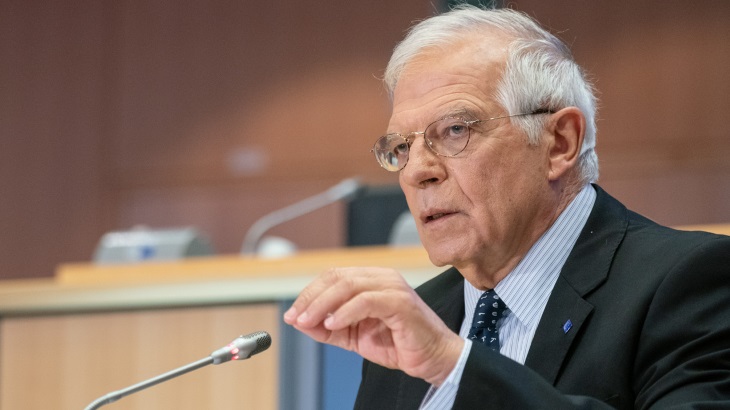Iran said on 5 January it will ignore the limit on the number of uranium enrichment centrifuges agreed under the deal, thus withdrawing from the last operational restriction imposed by the 2015 agreement. The announcement followed the US assassination of Iranian General Qasem Soleimani and marked Tehran's fifth step in reducing its JCPOA commitments - originally agreed in exchange for the lifting of economic sanctions.
"The aim of the mechanism is to resolve issues relating to the implementation of the agreement within the framework of the Joint Commission. In this respect I note the foreign ministers' intention 'to preserve the JCPOA in the sincere hope of finding a way forward to resolve the impasse through constructive diplomatic dialogue'," Borrell said in a statement on the EU's website. The dispute resolution mechanism "requires intensive efforts in good faith by all", he said, adding that he expects all JCPOA participants "to approach this process in that spirit".
UK Prime Minister Boris Johnson said in an interview with BBC Breakfast today that he wants to work with the USA and the UK's other allies to replace the current agreement to stop Iran acquiring a nuclear weapon. He said the UK would continue to back the existing deal which President Donald Trump withdrew the USA from in May 2018, saying: "Let's replace it and let's replace it with the Trump deal."
"We're going to come under pressure, everybody will say, 'well you've got to get rid of this nuclear deal, the JCPOA', that's what Trump wants. My point to our American friends is, look, somehow or other we've got to stop the Iranians acquiring a nuclear weapon, that's what the JCPOA does, but if we're going to get rid of it, then we need a replacement," Johnson said.
British Foreign Secretary Dominic Raab later gave a statement in the House of Commons, during which he said that the E3 had been “left with no choice”, but to refer Iran to the JCPOA’s dispute resolution mechanism.
Raab set out Iran’s “pattern of non-compliance” that started in May last year, leaving the JCPOA “a shell of an agreement”. The timeline he outlined is as follows: on 1 July 2019, the IAEA reported that Iran had exceeded key limits on low enriched uranium stockpile limits; on 8 July IAEA reported Iran had exceeded its 3.67% enriched uranium production limit; on 5 November, the IAEA confirmed that Iran had crossed its advanced centrifuge research and development limits; and then on 7 November 2019, the IAEA confirmed that Iran had also restarted enrichment activities at the Fordow facility; on 18 November, the IAEA reported that Iran had exceeded its heavy water limits; and on 5 January of this year, Iran announced that it would no longer adhere to JCPOA limits on centrifuge numbers.
“We are triggering the DRM, because Iran has undermined the objective and purpose of the JCPOA, but we do so with a view to bringing Iran back into full compliance. We are triggering the DRM to reinforce the diplomatic track, not to abandon it,” Raab said. “For our part, as the United Kingdom, we were disappointed that the US withdrew from the JCPOA in May 2018.”
The European External Action Service will now coordinate and convene the dispute resolution mechanism process, he said, adding that, as a first step, it will call a meeting of the Joint Commission, bringing together all parties to the JCPOA within 15 days.
The JCPOA was signed in July 2015 by Iran and the E3/EU+3 (China, France, Germany, Russia, the UK and the USA - also referred to as the P5+1 - plus the European Union) and implemented in January 2016. Under its terms, Iran agreed to limit its uranium enrichment activities, eliminate its stockpile of medium-enriched uranium and limit its stockpile of low-enriched uranium over the subsequent 15 years.
On 12 January, the E3 issued a statement saying they remained committed to the JCPOA and to preserving it, and they remained "ready to engage with Iran".
In his statement today, Borrell said the JCPOA is "a significant achievement of sustained multilateral diplomacy following years of negotiations".
"In light of the ongoing dangerous escalations in the Middle East, the preservation of the JCPOA is now more important than ever," he said.
Iran's President Hassan Rouhani dismissed Johnson's call for a new "Trump deal" to replace the 2015 nuclear agreement. "I do not know what Mr Prime Minister in London is thinking," he said. "All Trump has done is break promises and violate laws and international rules."
In a televised speech, reported by the BBC, Rouhani also criticised the European powers' decision to trigger the dispute resolution mechanism and their failure to ensure his country enjoyed the economic benefits of the nuclear deal. "The next step you need to take is to return to your commitments," he said.
The Iranian leader had "made it clear to two European leaders" that Iran’s actions regarding the deal were reversible, and that its nuclear programme is under the supervision of the International Atomic Energy Agency. He added: "If you take the wrong step, it will be to your detriment. Choose the right path, which is to return to the [nuclear deal]."















